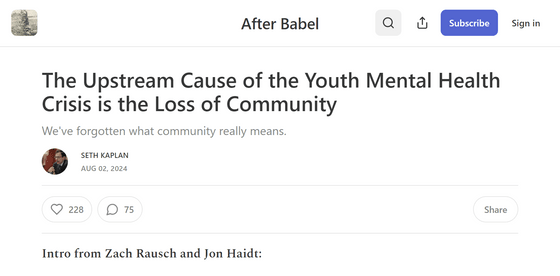A loss of community is a root cause of the youth mental health crisis, but what exactly is 'community' and why do kids need real-world community?

Seth Kaplan, a professor at the Johns Hopkins School of Advanced International Studies, called for a 'real-world community' to address youth mental health issues.
The Upstream Cause of the Youth Mental Health Crisis is the Loss of Community

The three most common causes of the worsening mental health of young people are 'less play,' 'the presence of smartphones in childhood,' and 'loss of community.' Kaplan argues that the three causes of 'less play' and 'harm of smartphone addiction' are caused by 'loss of community,' and that 'loss of community' is the fundamental cause.
Kaplan explained what he means by the word 'community' as follows:
A mutually reinforcing web of overlapping, emotionally charged associations and relationships
A set of shared values, norms, and goals - a common culture that provides unity and constraints
A common identity, ideally based on a common history and story, and on a recognition of interdependence
A shared ritual that celebrates the group, its past, and its future.
High reliability
High levels of commitment, limited exit options or high exit costs
Recognize and respect a shared authority figure who guides group decision-making
- Keystone actors and organizations that bridge and connect various members
Diverse skills and personalities who can offer complementary values to the group, such as money, time, or expertise
Role models who demonstrate cultural behaviors that a group should ideally emulate or at least aspire to.
- Actively include all members who share the same identity or location, demonstrating a high level of inclusivity
The ability to strongly encourage certain behavioral norms through moral suasion and punish misconduct when necessary.
As the list suggests, belonging to a community means giving up some of your freedom in exchange for safety and support, and giving up your freedom is hard for modern people to accept, making it difficult to create a community.

Children's knowledge and attitudes are not taught directly by adults, but are developed through their interactions with people they meet at school and in their neighborhoods. When adults and older children in their neighborhood, for example, show each other kindness, generosity and responsibility, children learn what norms to aspire to.
Kaplan points out that local communities are 'durable and strong' and cannot be replaced by online communities such as those built on social media. Online communities do not necessarily help you when you need help, nor do they protect you when you are weak. Online communities also have little ability to expand the dense social networks that act as a comfort blanket when you are in trouble, or the informal, supportive daily interactions that local communities provide.
Of course, this doesn't mean that online communities are worthless; online relationships can strengthen real-world relationships and groups, and they can connect people who would never have met otherwise. 'What each community offers is irreplaceable, and we need to clearly recognize their limitations,' Kaplan said.

Kaplan adds, 'If you're a parent and you want to join or build a community that engages your children, it's important to choose a place to live based on social wealth, get involved in neighborhood organizations and activities and spend time in places where local people congregate, and build your neighborhood community by taking advantage of organizations like schools, libraries, and local businesses.'
It is important to have a deeper discussion about young people's use of social media, but when doing so, it is important to recognize the strength of local communities. 'If kids have strong, real-world, face-to-face relationships, they are less likely to become addicted to the virtual world and less likely to fall into a mental health crisis,' Kaplan wrote in her blog.
Related Posts:
in Note, Posted by log1d_ts







